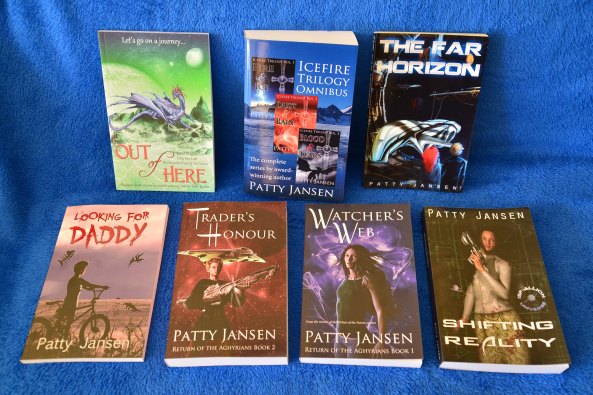Another year has gone by. I did one of these posts last year, and thought it would be fun to update it.
Why?
Several reasons:
- Not all self-publishers are Hugh Howey or Bella Andre or any of the other names that you’ll find in the top of various genres. In fact, most of them aren’t.
- There is still a real and not insubstantial amount of money to be made from self-publishing, even if you’re a complete nobody like me. The truth for writers like me is that this money is more than I’d be able to get from selling my book to a publisher. Traditional advances in Australia are $3000. I wouldn’t see myself sell more than two books a year to a publisher year after year.
- Few people talk real money and real numbers. I like being real, so I put my numbers on the table, warts and all.
Several things happened in the past year:
- Most importantly, Kobogate. Remember that last year most of my income was from Kobo? No more. I think it went like this: In October, Kobo changed their website. The company they hired were clowns and they goofed up the categories as they were listed on the sales pages. Despite many complaints (my Icefire Trilogy was listed as Religious fiction FFS), they couldn’t fix it. (My theory: the IT company had signed off on the project and they had trouble getting them back). Then Erotica books were inadvertently passed onto resellers as Children’s books. The proverbial hit the fan. It affected all sales at Kobo, including mine. In my best month, I sold almost 200 books there. I’ve not sold more than 100 per month since.
- A new player entered the market: Google Play. Sales there are increasing.
- I never sold anything on Amazon UK, but that has changed. Don’t ask me why.
- I moved most of my listings at B&N from Smashwords to D2D. This increased my sales there a lot.
I also published “some” new books since last September:
- Return of the Aghyrians 3: Soldier’s Duty
- Ambassador 1: Seeing Red
- Ambassador 2: Raising Hell
- Return of the Aghyrians 4 : Heir’s Revenge
- Innocence Lost (For Queen And Country book 1)
- Willow Witch (For Queen And Country book 2)
- The Idiot King (For Queen And Country book 3)
That’s SEVEN books. It looks a little more impressive than it is, because some of those books were already written. I’ve been committed to writing and completing series. The Aghyrians series is now done. I may or may not write a prequel. It is also mostly written, but would need a fair bit of salvage. At the moment my priorities are the Ambassador series and For Queen And Country. The latter is a slightly different beast from what I’ve written before: it’s a big story, the books are fairly short, 45-60K, and they’re episodes rather than complete stories. There should be at least two more volumes in the coming year.
Some observations on selling and marketing for self-publishers:
- If you want to have decent sales, you absolutely have to write series or at least related books
- You make the first book free and advertise it (by the way, Ambassador 1 won’t be free in the forseeable future, so you don’t need to wait for that)
- Books that are not part of series sell poorly. Yes, when I get some time I’ll write the sequel to Shifting Reality. I love that book to bits, and the only way to get it selling better is to write a sequel. I realise how ass-backward this will sound to any regular publisher. Self publishers often report that a series doesn’t sell much at all until there are a number of books available.
- Unless you hit the jackpot, there is no magic bullet. Each release increases your sales a little bit. Having a number of series and publishing them on all platforms is important. You see people buy all of your books one after the other.
So, the numbers:
In the past year, I sold 3876 books. Total income: about $11,000 (a bit fuzzy due to currency issues).
Vendors:
- Amazon – 1823
- Kobo – 872
- B & N – 640
- Apple – 381
- Smashwords (retail site) – 55
- Google Play (listed there in December) – 51
Bestselling titles with copies sold:
- Dust & Rain 873
- Blood & Tears 749
- Trader’s Honour 483
- Soldier’s Duty 363
- Watcher’s Web (before I made it free) 328
- Icefire Trilogy 207
- Innocence Lost (before I made it free) 193
- Ambassador 1: Seeing Red 157
- The Far Horizon 78
- Willow Witch 69
Now this may not sound very impressive, but consider this:
Total income of series from publication to date:
- Icefire Trilogy (complete, last book published May 2013): $13,000
- Aghyrians series (complete, last book published July 2014): $5000
- Ambassador series (not complete, 2 books out, ebooks only): $700
- For Queen And Country (not complete, 3 books out): $300
Income shoots up when a series is complete, and books keep selling every year, adding to the total income vs. investment for each book. It’s not a once-off payment. Therefore, the bigger your stable of books, the better your overall sales will be. Investment in series takes a while to get going, but keeps on delivering as long as you get downloads on that first free book.
So that’s it for this year. Meanwhile, if you’re asking how I know all this, I’d like to plug the program Trackerbox, which eats all these damn spreadsheets and spits out numbers with the click of a button.
My Earnings From Self-publishing 1 Oct 2013 – 30 Sept 2014 was originally published on Must Use Bigger Elephants


